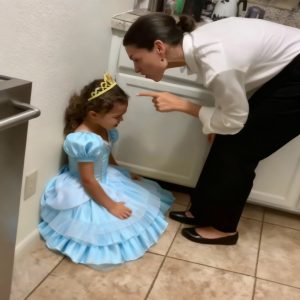It started like any other shift.
I was doing a routine check around a park in Modesto when I saw her—barefoot, wrapped in a threadbare hoodie, curled up on a bench.
She couldn’t have been more than 19. When I asked if she was okay, she looked up with glassy eyes and whispered, “I’m just trying to keep her warm.”
That’s when I saw the bundle on her chest—a tiny baby, barely a week old. I radioed in for support, but something about her made me stay.
She wasn’t high or aggressive, just scared and exhausted. Said her name was Kiara.
She’d aged out of foster care a few months back, gave birth in a motel, then ended up on the streets. The baby’s name was Nia. No birth certificate, no hospital records.
Just the two of them, hanging on. We got them to a shelter, and I figured that was the end of it. But it wasn’t.
I kept thinking about that baby—how she gripped my pinky with her whole hand when I first held her. I visited the shelter a week later, then again.
Eventually, Kiara started trusting me. She’d ask me stuff like what diapers I thought were best, or how to tell if a baby had a fever. Then one afternoon, she pulled me aside. She’d made up her mind. “I’m not ready to be a mom.
But you… you care. She smiles when she sees you.” I stood there, speechless. I mean, who wakes up thinking they’ll be asked to adopt a baby before dinner? But something inside me just… clicked. I told her I’d look into it. That night, I sat in my car outside the precinct and cried. I’d never pictured myself as a father. I didn’t even have a crib or a clue. But I knew I couldn’t say no. What I didn’t expect—what no one warned me about—was what came next…
…the system.
Foster care, social services, legal red tape—suddenly, I wasn’t just a cop trying to help a young woman and her baby. I was knee-deep in paperwork, home studies, background checks, and court hearings.
Even with Kiara’s written consent, it wasn’t simple. Nia didn’t officially exist yet. No birth certificate, no social security number. The caseworker told me, “She’s a legal ghost. We have to build her identity from scratch.”
And Kiara? She wasn’t ready to be a mom, but that didn’t mean letting go was easy. She went quiet for a few weeks, stopped returning my messages. I panicked. I thought maybe she’d vanished again—like so many kids before her. Slipped through the cracks.
But she came back. She’d needed time. She showed up at the shelter with a manila envelope full of scribbled letters—one for me, and one for Nia to read someday.
“I want her to grow up knowing I didn’t walk away,” Kiara said, her voice trembling. “I just knew someone else could give her more.”
It took six months. During that time, I learned how to sterilize bottles, how to calm a screaming newborn at 2 a.m., how to install a car seat (wrong three times before I got it right), and how to fall in love with a baby who wasn’t born from you—but was somehow always yours.
When the judge finally said the words—“adoption approved”—I held Nia in my arms and just stared at her, thinking about benches and pinkies and broken beginnings.
And I thought of Kiara. She wasn’t there that day—she said it would hurt too much. But the letter she gave me was.
“Tell her she was never unwanted,” it said.
“Tell her I chose you because I wanted her to be safe.
To be held. To be seen.Tell her I loved her enough to let her go.”
Now it’s been three years. Nia calls me “Dad.” She’s fearless and loud and wild with curls. She runs through that same park where I first found her, now with light-up shoes and giggles that make strangers turn their heads and smile.
I still wear the badge. But something changed the day I met Kiara. I stopped seeing “cases” and started seeing stories. Started listening harder. Started staying longer.
Because sometimes, being in the right place at the right time doesn’t mean stopping a crime.
Sometimes it means starting a life.
And I thank her—both of them—every day for giving me mine.





